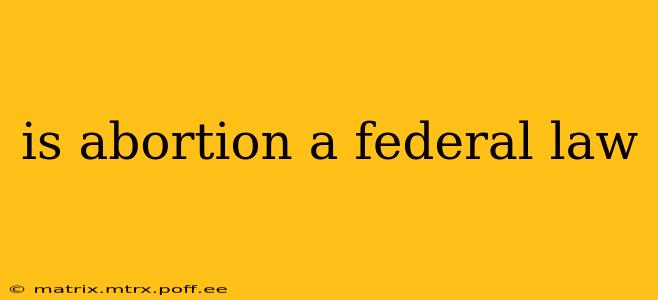Is Abortion a Federal Law? The Complex Landscape of Reproductive Rights in the United States
The question of whether abortion is a federal law in the United States is a complex one, with the answer being a resounding no, but with significant nuances. There is no single federal law that either explicitly legalizes or criminalizes abortion nationwide. Instead, the legal landscape surrounding abortion is a patchwork of federal and state laws, court decisions, and ongoing political battles. This has led to significant variations in access to abortion services across different states.
This lack of a uniform federal law is a direct consequence of the landmark Supreme Court case Roe v. Wade (1973) and its subsequent overruling in Dobbs v. Jackson Women's Health Organization (2022). Let's delve deeper into the historical and current legal framework.
What was the impact of Roe v. Wade?
Roe v. Wade established a woman's constitutional right to abortion, based on the right to privacy under the Fourteenth Amendment. This decision didn't create a federal law mandating abortion access, but it did invalidate state laws that prohibited abortion outright. The decision created a trimester framework, granting states more regulatory power as the pregnancy progressed. This framework was later modified in Planned Parenthood v. Casey (1992), which replaced the trimester framework with the "undue burden" standard. This meant states could not place substantial obstacles in the path of a woman seeking an abortion before viability (the point at which a fetus can survive outside the womb).
How did Dobbs v. Jackson Women's Health Organization change things?
The Dobbs decision overturned Roe v. Wade, effectively ending the constitutional right to abortion. This ruling returned the authority to regulate abortion to individual states. As a result, some states have enacted near-total bans on abortion, while others have maintained or expanded access to abortion services. This has created a stark geographical disparity in abortion access across the country.
What federal laws do relate to abortion?
While there's no federal law directly regulating abortion access after Dobbs, several federal laws indirectly impact abortion care:
-
The Hyde Amendment: This amendment prohibits the use of federal funds to pay for most abortions. This has significant implications for low-income women who rely on government-funded healthcare.
-
The Affordable Care Act (ACA): While the ACA doesn't directly fund abortions, it mandates that most insurance plans cover preventive care services, including some reproductive health services. However, the extent of coverage for abortion-related services is subject to ongoing legal challenges.
-
Other Federal Regulations: Other federal laws and regulations might indirectly affect abortion access, such as those related to healthcare provider licensing and standards.
What are the implications of the lack of a federal abortion law?
The lack of a federal law leads to:
-
Unequal access to abortion: Women in states with restrictive laws face significant barriers to accessing abortion services, including travel restrictions and financial burdens.
-
Legal challenges and litigation: The varying state laws have resulted in numerous legal battles over abortion access, creating uncertainty and confusion.
-
Political polarization: Abortion remains a highly divisive issue in American politics, shaping electoral campaigns and legislative agendas at both the state and federal levels.
What is the future of abortion rights in the US?
The future of abortion rights in the US is uncertain. The Dobbs decision has sparked renewed activism and legal challenges, with ongoing efforts to codify abortion rights at the federal level or through state-level initiatives. The legal landscape surrounding abortion will likely continue to evolve in the coming years.
This complex situation underscores the absence of a single, overarching federal law on abortion. The issue remains deeply contentious, with far-reaching consequences for women's health and reproductive rights across the nation.
